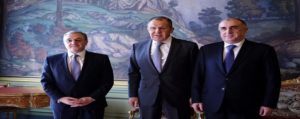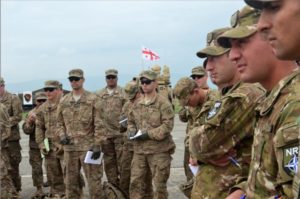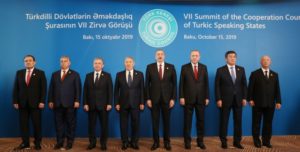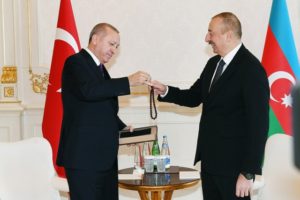
Beniamin Poghosyan – Russia and Turkey in the South Caucasus – Russia and Turkey in the South Caucasus
June 8, 2020 | regnum.ru/news/polit/
annotation
Strategic rivalry and the Madrid principles for the settlement of the Nagorno-Karabakh conflict.
Despite the outbreak of COVID-19, Russia has recently made new efforts to advance a phased solution to the Nagorno-Karabakh conflict. This decision is based on the so-called Madrid Principles and Six Core Elements, first published in a statement by the presidents of Russia, the United States and France in July 2009. However, the decision on a phased approach dates back to the end of 1997, when the clear efforts by the co-chairs of the OSCE Minsk Group to reach an agreement led to the resignation of the first president of Armenia. After a 6-year hiatus, this logic again, apparently, began to dominate the settlement process since 2004. Six elements include the withdrawal of troops of the Nagorno-Karabakh Republic from more than 50 percent of its territory, the deployment of peacekeeping forces and the final determination of the status of Karabakh through a legally binding expression of will. However, neither the date nor the conditions for this procedure have been determined and left for decision making during future negotiations. These ideas were supported by all three co-chairing states, but it was Russia that made great efforts to advance this decision in 2009-2011.

Then, Russian President Dmitry Medvedev organized more than 10 tripartite summits with the participation of the presidents of Armenia and Azerbaijan. Nevertheless, the failure of the Kazan summit in June 2011 seemed to destroy all hopes that the Madrid Document could ever bring peace to Nagorno-Karabakh. In April 2016, the Azerbaijani failure in a large-scale attack on the Nagorno-Karabakh Republic led to some changes in the negotiations. Instead of talking about the withdrawal of forces and the deployment of peacekeepers, confidence-building and security-building measures began to dominate the process. The implementation of the Vienna and St. Petersburg agreements on the launch of the OSCE ceasefire investigation mechanisms and the expansion of the OSCE Observer Mission, carried out by the office of the Personal Representative of the OSCE Chairman-in-Office, were one of the key topics of several rounds of negotiations held in May 2016 – May 2018.
Despite the absence of any significant progress on these issues, Russia, obviously, has recently stepped up its efforts to promote the implementation of a phased approach. In a statement dated April 21, 2020, Russian Foreign Minister Sergei Lavrov noted that the new document was presented to the Foreign Ministers of Armenia and Azerbaijan during a meeting in Moscow in April 2019. Mr. Lavrov did not disclose all the details, but from his words it was obvious that this document was based on the same ideas that had been circulated since 2004. Armenia and the Nagorno-Karabakh Republic are again invited to destroy the security zone around Karabakh only in order to receive promises to open communications and hold a referendum in the uncertain future to determine the final legal status of Karabakh. It can be stated that both Armenian republics are invited to surrender, since an agreement based on the formula “Territories in exchange for promises” is equivalent to surrender.

Some experts say that Russia is interested in deploying its peacekeepers on the new line of contact, which will be established after the withdrawal of the Karabakh forces from their current positions. This will give Russia tangible additional leverage over Azerbaijan and will provide an opportunity to control part of the Azerbaijani-Iranian border. According to this logic, this is enough for Russia to force Armenia to make this decision. However, this scenario will bring significant changes to the geopolitics of Transcaucasia, and, surprisingly, the winner will be not Russia, but Turkey.
Despite the recent ups and downs in Russian-Turkish relations, the two states clearly see each other as strategic competitors in the Caucasus. Russia is interested in limiting the influence of any foreign power in the region, since the Kremlin sees Transcaucasia as part of its legitimate spheres of influence. The main rivals of Russia in the region are the USA, EU and Turkey. Iran has wide interests in the region and perceives it as part of the general Iranian cultural area. Nevertheless, Tehran is embroiled in a strategic rivalry with Israel and Saudi Arabia in the Middle East. At the same time, Iran is facing a campaign of maximum pressure from the United States. Thus, Iran has no resources for active participation in the region, and Tehran is concerned about preventing the use of the Caucasus as a springboard for any kind of anti-Iranian activity. As for China, Beijing has just begun to enter the region and it does not have enough resources, as well as intentions, to compete with Moscow.
Thus, the main competitors of Moscow in Transcaucasia are the USA, EU and Turkey. The US is actively involved in Georgia, both bilaterally and through cooperation between NATO and Georgia. The United States supports Azerbaijan in its efforts to deliver its gas and oil to the world market, bypassing Russia. The main mechanism of EU policy in the region is the Eastern Partnership program. Georgia signed the Association Agreement with the creation of an in-depth and comprehensive free trade zone, and Armenia signed a comprehensive and expanded partnership agreement with the EU. Nevertheless, the EU is an economic and regulatory player in the region and does not have hard power, while the United States, despite its strong positions in the region, does not consider Transcaucasia as an area of its vital interests. The region is perceived in Washington through the prism of its Russian policy. Meanwhile, Ukraine is the main area of confrontation between the USA and Russia in the post-Soviet space, and the main attention of Americans is concentrated there.

Thus, Turkey is the main rival of Russia in the region. Turkey has a historical relationship with the region since the Ottoman Empire and has been Russia’s strategic rival for the past 300 years. Despite the recent history of tensions with the United States, Turkey is and will remain a key member of NATO for the foreseeable future, and the United States sees Turkey as an effective tool for implementing its policy in the Caucasus. It is not surprising that the United States supports the Azerbaijan-Georgia-Turkey alliance, which has clear anti-Russian features. Turkey has systematically strengthened its economic influence in Georgia, which has actually been transformed into a transit corridor connecting Azerbaijan and Turkey through a network of pipelines and highways. The tensions between Russia and Georgia are clearly contributing to Turkey’s goal of strengthening its position in Georgia.
. However, Turkey’s strategic partner in the South Caucasus is not Georgia, but Azerbaijan. They share ethnic and linguistic similarities, which were emphasized by the famous slogan of former President Heydar Aliyev, “One nation, two states.” However, the strategic relations of Ankara and Baku have much wider consequences. Both states formed the basis for the creation of the Cooperation Council of Turkic Speaking States, an intergovernmental organization created in 2009 and uniting Azerbaijan, Turkey, Kazakhstan, Kyrgyzstan and Uzbekistan as full members and Hungary as an observer state. This organization is the embodiment of Turkey’s desire to gain strategic influence in Central Asia and combine the capabilities of Turkic-speaking states. Given China’s growing influence in Central Asia, where Beijing has surpassed Russia in economic terms and is gradually increasing arms sales, the United States can use this organization as an important tool to advance its anti-Chinese policies in the region. Another role of this organization may be to initiate anti-Chinese protests in the Xinjiang Autonomous Region of China in order to protect another Turkic-speaking people – the Uyghurs. Meanwhile, the growth of the Muslim population in Russia, mainly concentrated in the North Caucasus and Tatarstan, makes this organization an effective tool that also contributes to the spread of instability in the southern parts of Russia.

Nevertheless, Turkey has no direct connection with Central Asia, and Armenia and the Nagorno-Karabakh Republic impede this. Currently, Turkey has approximately 10 km of land border with the Nakhchivan Autonomous Republic, an Azerbaijani exclave surrounded by Armenia and Iran. Meanwhile, Armenia and the Nagorno-Karabakh Republic separate Nakhchivan from Azerbaijan by approximately 180 km of territory (45 km of the territory of Armenia and 135 km of the territory of the Nagorno-Karabakh Republic). It is not surprising that the first summit of the Cooperation Council of Turkic Speaking States was organized in Nakhichevan, and very often the Azerbaijani leadership speaks of Armenia and the Nagorno-Karabakh Republic as the only obstacles to the unification of the Turkish world from Turkey to the borders of China.
Meanwhile, the basic principles for the settlement of the Karabakh conflict, also supported by Russia, provide for the withdrawal of troops of Nagorno-Karabakh from 135 km of territories on the border of the Nagorno-Karabakh Republic with Iran and the establishment of Azerbaijani control over these territories. Thus, this will greatly contribute to the realization of Turkey’s dream of uniting the Turkic world under the leadership of Ankara, making a small 45 km of the territory of Armenia the only buffer separating Turkey from Azerbaijan and Central Asia. This will strengthen the position of Azerbaijan in the region, which, in turn, means the strategic strengthening of Turkish influence in the Caucasus. In this case, Turkey will be in a much better position to compete with Russia in the region. The Kremlin may believe that the possible deployment of Russian peacekeepers in these territories will limit Turkey’s ambitions and create an effective barrier to Turkish expansion. Russia’s position may seem reasonable, but from a strategic point of view there are no guarantees for the unlimited deployment of Russian troops in these territories.
Meanwhile, such events will significantly weaken Russia’s only ally in the region – Armenia. Given the history of Armenian-Turkish relations, Ankara’s refusal to recognize the Armenian Genocide, organized in the last years of the Ottoman Empire, and its unconditional support for Azerbaijan during the Nagorno-Karabakh conflict, Armenia’s vital national interests require preventing the growth of Turkish influence in the Caucasus. Thus, Armenia and the Nagorno-Karabakh Republic are objectively interested in dividing Azerbaijan and Turkey, otherwise they may face a new threat of the Genocide.

Meanwhile, if Armenia and the Nagorno-Karabakh Republic are forced to adopt the Madrid principles and basic elements, this will not only jeopardize their geostrategic positions, but also significantly reduce the importance of the alliance with Russia for Armenia. This will strengthen the forces in Armenia and the Nagorno-Karabakh Republic that advocate a strategic reassessment of the Armenian-Russian relations. Meanwhile, it should be noted that the implementation of the basic principles will not finally solve the Karabakh conflict, since the differences in time and the conditions of the future referendum are likely to undermine any possibility of a lasting peace. This will only destabilize the situation, encourage Azerbaijan and make Armenia and Karabakh more vulnerable.
Thus, promoting the Madrid principles, Russia paradoxically can only strengthen the influence of its strategic competitor in the Transcaucasus. Moscow will significantly weaken its own positions and actually end its alliance with Armenia. One can only wonder if Russian politicians are ready to damage the Kremlin’s position in the Caucasus in the face of growing global instability and competition between the great powers.
Beniamin Poghosyan – candidate of historical sciences, director of the Center for Political and Economic Strategic Studies (Yerevan, Armenia).
June 8, 2020
Beniamin Poghosyan
regnum.ru/news/polit/2975553.html
English translation – LOUSAVOR AVEDIS:
